Steel Grating Handrail
LK Die Casting Machine / 2024-09-29 10:02:43
2024-09-29 by Cherry
Introduction
With the rapid development of the manufacturing industry,
die-casting machines play an increasingly important role
in metal casting. As an efficient molding process,
die-casting machines, as important metal molding
equipment in industrial production, can quickly produce
metal parts of complex shapes. The safety and convenience
of their operation have always attracted much attention.
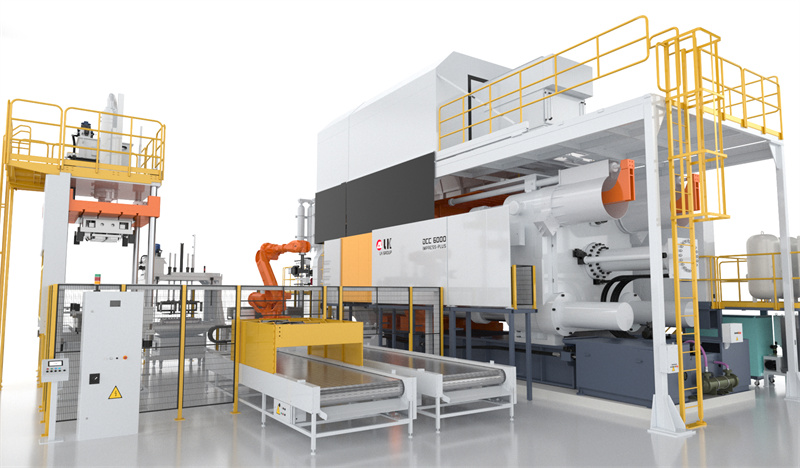
In this process, steel grating handrails, as a common protective
and auxiliary devices, play an indispensable role in the
field of die-casting machines. This article will explore in
depth of the application of steel grating handrails in die-casting
machines, including their functions, characteristics, installation
methods, and their importance to the overall operation of
die-casting machines and the safety of operators.
Overview of die-casting machines
1. Working principle of die-casting machines
Die-casting machines are equipment that quickly injects
liquid or semi-liquid metal into the mold cavity under
high pressure to solidify and form it, thereby obtaining
precision castings.
It is mainly composed of a clamping mechanism, an injection
mechanism, a hydraulic system, an electrical control system,
and other parts. During the working process, the clamping
mechanism first closes the mold, and then the injection
mechanism injects the molten metal into the mold cavity at
high speed and high pressure.After pressure maintenance and
cooling, the mold is opened and the molded casting is taken
out.
2. Application fields of die-casting machines
Die-casting machines are widely used in many industries
such as automobile manufacturing, aerospace, electronic
communications, and machinery manufacturing. For example,
automobile engine cylinders, gearbox housings, wheels and
other parts, as well as the shells of electronic products
such as mobile phones and computers can be produced by
die-casting machines.
Since the die-casting process can produce castings with
complex shapes, high dimensional accuracy, and good surface
quality, it occupies an important position in modern
industrial production.
3. Safety risks of die-casting machines
Although the die-casting machine has efficient production
capacity, there are certain safety risks during operation.
High-temperature molten metal, high-speed injection parts,
and strong clamping force may cause harm to the operator.
In addition, the working environment around the die-casting
machine is usually more complicated, and there are potential
dangers such as slipping and tripping. Therefore, taking
effective safety protection measures are crucial to ensure
the normal operation of the die-casting machine and the life
safety of the operator.
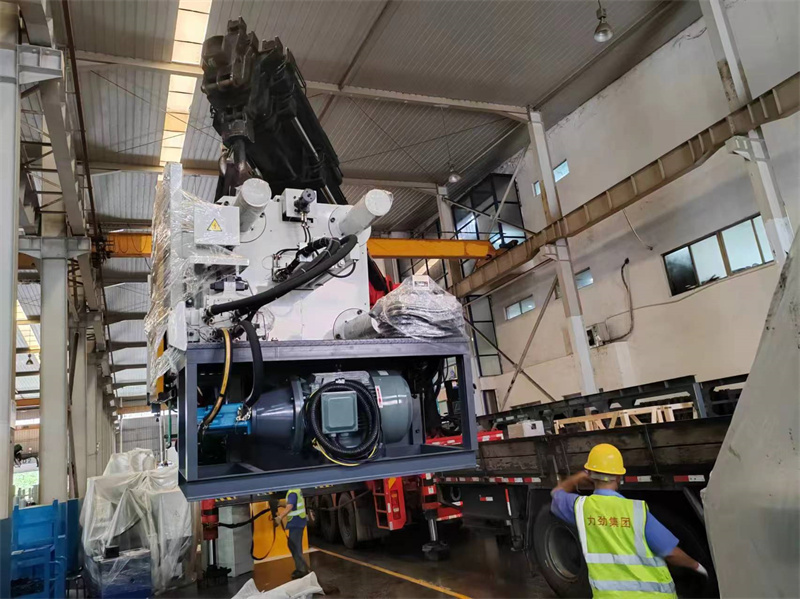
Features and advantages of steel grating handrail
design
The design of steel grating handrails usually adopts a
modular structure, so that it can be flexibly adjusted
according to different types of die-casting machines.
During the design process, the following aspects should
be considered:
1. Ergonomics: The height, width, and inclination of the
handrail should conform to the principles of ergonomics
to ensure that workers maintain a comfortable posture
during long-term operation.
2. High strength and durability
The selection of steel is crucial. High-quality steel
can not only withstand heavy weight but also resist
high temperature and corrosion, and extend its service
life. The steel grating handrail is made of high-quality
steel, with high strength and hardness, and can withstand
large external impact.
In the working environment of the die-casting machine,
it is often subject to vibration, collision, and operator's
leaning during equipment operation.The high-strength
characteristics of the steel grating handrail ensure
that it can play a long-term and stable role, is not
easy to deform or damage, and prolongs its service life
and reduces maintenance costs.
3. Good anti-slip performance
The working area around the die-casting machine may have
oil stains, metal chips, and other debris, which can
easily cause the ground to be slippery and increase the
risk of operators slipping. The surface of the steel
grating handrail is usually specially treated with good
anti-slip properties.
Even in a wet or greasy environment, the operator can
firmly hold the handrail to ensure the safety of walking
and operation. This anti-slip property is of great
significance to improving the overall safety of the
die-casting machine workplace.
4. Ventilation and light transmittance
Compared with solid handrail materials, the steel grating
handrail has unique ventilation and light transmittance.
Its structural design allows air to circulate freely,
reduces the accumulation of dust and moisture, and helps
to keep the environment around the die-casting machine
dry and clean.
At the same time, good light transmittance also makes
it convenient for operators to observe the operation
of the equipment, detect abnormalities in time, and take
corresponding measures. This ventilation and light
transmittance not only improves the quality of the working
environment, but also provides convenience for the
maintenance and management of the equipment.
5. Beauty and modernity
Modern industrial equipment not only focuses on
functionality, but also appearance design has become
increasingly important. The design of the steel grating
handrail should be coordinated with the overall style
of the die-casting machine to enhance the overall beauty
of the production environment.
The appearance of the steel grating handrail is simple
and generous, with smooth lines, and has a certain sense
of modernity and industrial beauty. It can be integrated
with various types of die-casting machines and the overall
style of the workplace, improving the overall image of the
work area. While focusing on production efficiency, it also
creates a comfortable and beautiful working environment for
operators, which helps to improve employees' work enthusiasm
and job satisfaction.
6. Easy to install and maintain
The installation of the steel grating handrail is relatively
simple, and it can usually be customized and installed
according to the actual layout and operation requirements
of the die-casting machine. It can be fixed in a suitable
position by welding, bolting, etc. The installation process
is fast and efficient, and will not cause too much interference
to the normal production of the die-casting machine.
In terms of maintenance, the steel grating handrail only needs
to be cleaned and inspected regularly. If damaged or deformed
parts are found, they can be replaced in time. Its simple
maintenance method reduces maintenance costs and maintenance
difficulties, ensuring that the handrail is always in good
working condition.
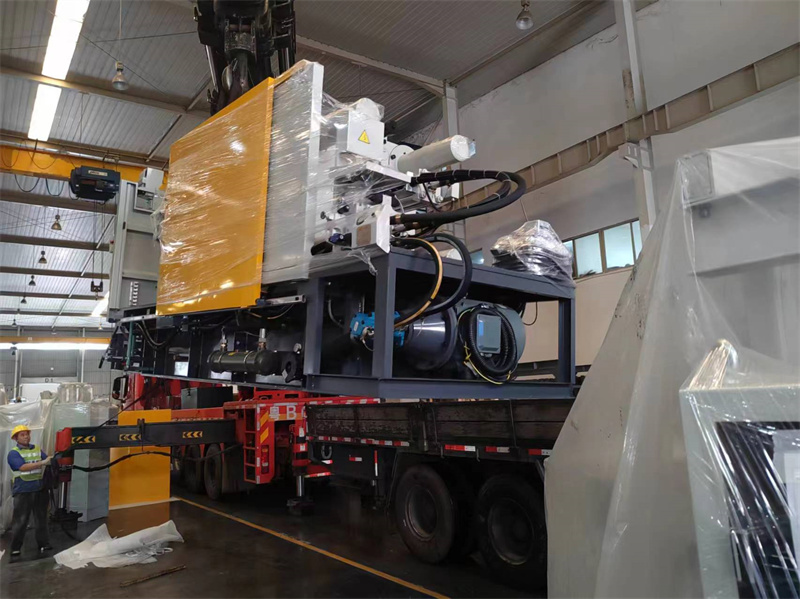
Advantage Analysis
1. Improve safety
The operating environment of the die-casting machine is
usually more complex, and workers face a variety of potential
dangers. The steel grating handrail provides workers with
a reliable support point, which helps to avoid falls and
other accidents.
2. Enhance work efficiency
By providing a stable operating platform, the steel grating
handrail helps workers work more effectively near the
die-casting machine. Workers no longer need to be distracted
by maintaining balance, so they can focus more on the task
at hand.
3. Easy to maintain
The material of the steel grating handrail is usually corrosion-resistant
and high-temperature-resistant steel, so it does not require
too much maintenance. This reduces the maintenance cost in
long-term use and improves the economy of the equipment.
Specific application of steel grating handrails in
die-casting machines
1. Operating platform handrails
The operating platform of the die-casting machine is the
main area for operators to operate and monitor the equipment.
The steel grating handrails are set around the operating
platform to provide operators with safe walking and
standing space. The operator can hold the handrail at
any time during the operation to maintain the balance and
stability of the body and prevent injuries due to accidental
falls.
For example, when the operator needs to adjust the parameters
of the die-casting machine, check the mold, or deal with
some emergencies, the steel grating handrail can provide
reliable support and protection for it to ensure the smooth
operation.
2. Stair handrails
In the die-casting machine workshop, stairs are usually set
up for operators to go up and down different working levels.
Stair handrails are important facilities to ensure the
safety of people going up and down the stairs. Steel grating
handrails have many advantages as stair handrails.
Its anti-slip performance can effectively prevent operators
from slipping when going up and down the stairs, especially
when there may be oil or other debris on the surface of the
stairs.
At the same time, the strength and stability of the steel
grating handrail can withstand the leaning and gripping force
of people when going up and down the stairs, ensuring the
safe use of the stairs. In addition, the ventilation and light
transmittance of the steel grating handrail makes the stairwell
more bright and the air more circulated, reducing the erosion
of the stair structure by the humid and dark environment, and
extending the service life of the stairs.
3. Equipment surrounding protective handrails
The surrounding areas of the die-casting machine, such as
the mold installation area and the metal liquid pouring area,
have higher safety risks. Setting up steel grating handrails
in these areas can form an effective protective barrier to
prevent operators from accidentally entering dangerous areas.
For example, during the mold installation process, the operator
needs to perform a series of delicate operations next to the
die-casting machine.
If there is no isolation of the protective handrail, it may
be injured by accidentally approaching a moving part or
high-temperature areas. The setting of steel grating handrails
can divide the safe area and the dangerous area, reminding
operators to pay attention to safety, and at the same time
restricting irrelevant personnel from entering the dangerous
area, reducing the probability of accidents.
4. Material conveying channel handrails
During the die-casting production process, raw materials
(such as metal ingots) and finished castings need to be conveyed.
The material-conveying channel is usually located around
the die-casting machine and people walk around the channel
frequently.
Setting steel grating handrails on both sides of the material
conveying channel can, on the one hand, provide safety protection
for operators when walking and to prevent collisions with
conveying equipment or materials; on the other hand, the
handrails can also play a guiding role, allowing personnel
to walk in an orderly manner in the channel, avoiding chaos
and congestion, and improving the efficiency and safety of
material conveying.
Installation points of steel grating handrails
1. Selection of installation position
When installing steel grating handrails, first of all,
according to the layout and operation process of the die-casting
machine, reasonably select the installation position of the
handrail. Make sure that the handrail is installed in a place
that is easy for operators to touch and need support, such as
the edge of the operating platform, both sides of the stairs,
and the boundary of the dangerous area around the equipment.
At the same time, the convenience of the handrail should be
taken into account to avoid the installation location affecting
the normal operation of the operator and the maintenance and
repair of the equipment.
When choosing the installation location, it is also necessary
to combine the actual situation on-site, such as space size,
light conditions, ventilation conditions, etc., to ensure that
the handrail can play the best protective and auxiliary role.
2. Determination of installation height
The installation height of the steel grating handrail should
comply with ergonomic principles and relevant safety standards.
Generally speaking, the height of the operating platform handrail
should be between 1.0 and 1.2 meters to ensure that the
operator can easily hold the handrail when standing and walking.
The height of the stair handrail should be adjusted according
to the slope of the stairs and the height of the user group,
usually between 0.9 and 1.1 meters. For the equipment perimeter
protection handrail and the material conveying channel handrail,
the height should be determined according to the specific
degree of danger and protection requirements, but generally
should not be less than 1.0 meters.
When determining the installation height, it is also necessary
to consider possible special circumstances, such as the height
limit when the operator wears a safety helmet or carries a large
objects, to ensure that the handrail can provide effective
protection for the operator in various situations.
3. Choice of fixing method
There are two main fixing methods for steel grating handrails:
welding and bolting. The welding fixing method has the advantages
of firm connection and good integrity, but it is not easy
to disassemble and adjust after installation. It is suitable
for permanent installation and occasions with high requirements
for handrail stability.
The bolt connection method has the characteristics of a convenient
installation and disassembly, easy adjustment and replacement,
and is suitable for situations where the handrail needs to
be maintained frequently or adjusted according to changes in
production processes. In the actual installation process,
the appropriate fixing method should be selected according
to the use environment and specific requirements of the
die-casting machine. Regardless of the fixing method adopted,
the strength and reliability of the connection part must be
ensured, and the fixing parts must be regularly checked
for looseness and tightening in time to ensure the safe
use of the handrail.
4. Coordinated installation with other equipment
In the die-casting machine workshop, steel grating handrails
often need to be installed in coordination with other equipment
and facilities. For example, on the operating platform, the
handrails should be reasonably arranged with equipment such as
consoles and protective doors to avoid mutual interference.
On the stairs, the handrails should be closely matched with
the railings, steps, and other components of the stairs to
ensure the safety and stability of the overall structure.
Around the equipment, the installation of handrails should
take into account the safe distance from the moving parts,
pipes, cables, etc. of the die-casting machine to prevent
the installation of handrails from affecting the normal
operation of the equipment or causing other safety hazards.
Before installation, comprehensive planning and measurement
should be carried out on-site, and a detailed installation
plan should be formulated to ensure that the steel grating
handrails can work in coordination with other equipment and
facilities to jointly protect the operation of
the die-casting machine and the safety of operators.
Maintenance and care of steel grating handrails
1. Daily cleaning
Regular cleaning of steel grating handrails is an important
measure to maintain their good performance and appearance.
Since there may be oil, dust, metal chips, and other debris
in the working environment of the die-casting machine, these
substances are easy to adhere to the surface of the handrail,
affecting the anti-slip performance and aesthetics of the
handrail.
Therefore, the handrail should be cleaned every day
or regularly with appropriate detergents and tools. For areas
with heavy oil pollution, special oil cleaning agents can be
used for cleaning, and then rinsed with clean water. During
the cleaning process, be careful to avoid using sharp tools to
scratch the surface of the handrail to avoid damaging its
protective coating and structure.
2. Inspection and maintenance
Periodically conduct a comprehensive inspection of the steel
grating handrail to promptly detect and deal with potential
problems. The inspection content mainly includes the structural
integrity of the handrail, the tightness of the connection parts,
the wear and corrosion of the surface, etc. If the handrail
is found to be deformed, broken, loose or corroded, it should
be repaired or replaced in time. For minor deformation and
damage, appropriate tools can be used for repair; for severely
damaged parts, new steel grating handrails must be replaced to
ensure their safety performance.
When repairing and replacing, they must be carried out in strict
accordance with relevant operating procedures and standards
to ensure the quality of repair and the compatibility of
replacement parts.
3. Anti-corrosion treatment
To extend the service life of the steel grating handrail
and prevent it from corrosion, corresponding anti-corrosion
measures should be taken according to the characteristics of
the working environment. If the air humidity in the die-casting
machine workshop is high or there is corrosive gas, the surface
of the handrail can be treated with an anti-corrosion coating,
such as spraying anti-rust paint, galvanizing, etc.
At the same time, it is necessary to pay attention to regular
inspection and maintenance of the anti-corrosion coating.
If it is peeled off or damaged, it should be repainted in time.
In addition, the corrosion risk of steel grating handrails can
be reduced by improving the ventilation conditions of the
working environment and reducing the emission of corrosive substances.
4. Lubrication and maintenance
For some active connection parts, such as the connection between
the handrail and the bracket, rotating parts, etc., lubrication
and maintenance should be carried out regularly to reduce friction
and wear and ensure the flexible use of the handrail. Select a
suitable lubricant and operate according to the prescribed lubrication
cycle and method. During the lubrication process, care should
be taken to avoid lubricants from contaminating the handrail surface
and the surrounding environment to avoid affecting its anti-slip
performance and working reliability.
Case analysis of steel grating handrail application
1. Case 1: A certain automotive parts die-casting plant
The die-casting plant has many large die-casting machines.
During the production process, safety issues have always been
the focus of the company. In order to improve the safety of
the die-casting machine operation area, the company has installed
steel grating handrails on the operating platforms, stairs and
dangerous areas around the equipment of all die-casting machines.
Through practical application, the sense of security of operators
during work has been significantly enhanced, and the incidence
of accidents caused by slips, collisions, etc. has been greatly
reduced. At the same time, the ventilation, light transmission
and aesthetics of the steel grating handrails have also been well
received by employees, improving the working environment and
improving work efficiency.
2. Case 2: Die-casting workshop of an electronic equipment manufacturing
company
The die-casting workshop of this company mainly produces precision
castings such as mobile phone shells, and has high requirements
for the production environment and equipment. When installing
the steel grating handrails, the company carefully designed the
installation position, height, and fixing method of the handrails
according to its production characteristics and process
requirements.
For example, on the operating platform, the layout of the handrails
and the control console is reasonable, which does not affect
the operator's operation of the equipment, but also provides
timely support and protection for it. In the material
conveying channel, the setting of the handrail not only ensures
the safety of the personnel, but also improves the efficiency
of material conveying through reasonable guidance. After a period
of operation, the steel grating handrails have played a positive
role in ensuring safe production, improving production efficiency
and optimizing the working environment, providing strong support
for the development of the enterprise.
Future development trends
With the advancement of science and technology, the design and
function of steel grating handrails will continue to improve. In
the future, intelligent handrails may become a trend, such as
integrating sensors to monitor the safety of workers' operations
and timely warn of potential dangers. In addition, the use of new
materials and 3D printing technology will make the design of
steel grating handrails more flexible and personalized.
Conclusion
As an important safety protection and auxiliary device, steel
grating handrails have broad application prospects and important
practical significance in the field of die-casting machines. With
its high strength, durability, anti-slip performance, ventilation
and light transmittance, it provides reliable safety protection
for operators of die-casting machines, and also improves the overall
safety and work efficiency of die-casting machine workplaces.
In practical applications, the type, installation location, and
installation method of steel grating handrails should be reasonably
selected according to the specific situation of the die-casting
machine, and attention should be paid to its maintenance and
maintenance to ensure that the handrails are always in good
working condition, which can escort the normal operation and
safe production of the die-casting machine.
With the continuous development of industrial technology
and the increasing requirements for safe production, the
application of steel grating handrails in die-casting machines
and other industrial equipment will become more and more
extensive, and its technology and performance will continue
to be optimized and improved,making greater contributions
to promoting the safe and efficient development of industrial
production.
We are LK Die die-casting machine Authorized Official Agent
for Egypt(EGY),Saudi Arabia(KSA),United Arab Emirates(UAE)
The Islamic Republic of Iran(Iran),Qatar(QAT),
The State of Kuwait(Kuwait), The Middle East
Contact us to discuss the details of your project and we'll
be happy to provide you with a review and quote.
Learn more about our die-casting services through:
https://www.zazdiecasting.com/ and https://ae.zazdiecasting.com/
OTHER CONTENT
-
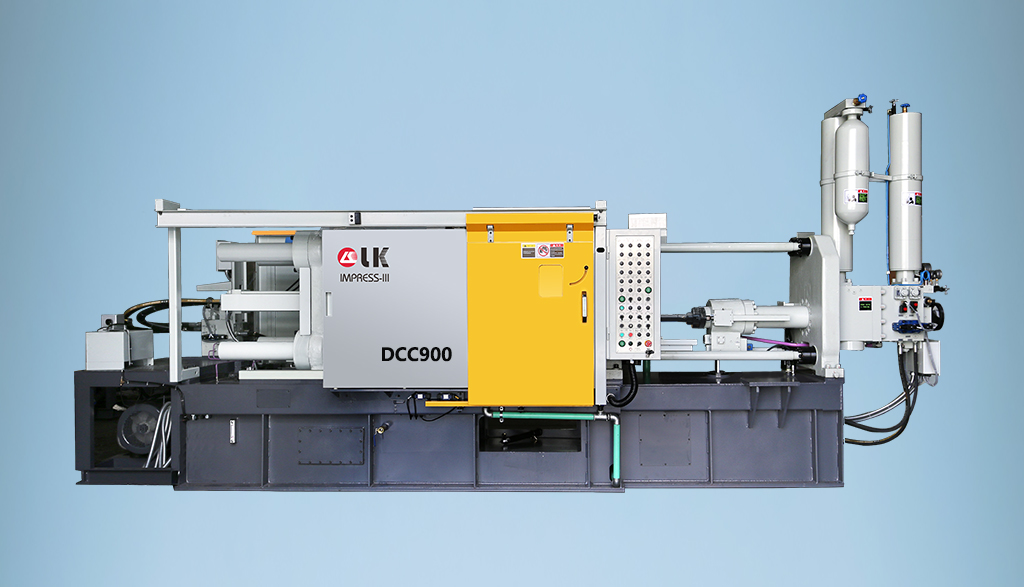
2024-09-19 14:16:15 LK Cold Chamber Die Casting Machine DCC900 Locking Force: 9000KN Die Height: 400-1000mm Space Between Tie Bars: 930x930mm Shot Weight: 13.5Kg Casting Area Max:2250c㎡
More -
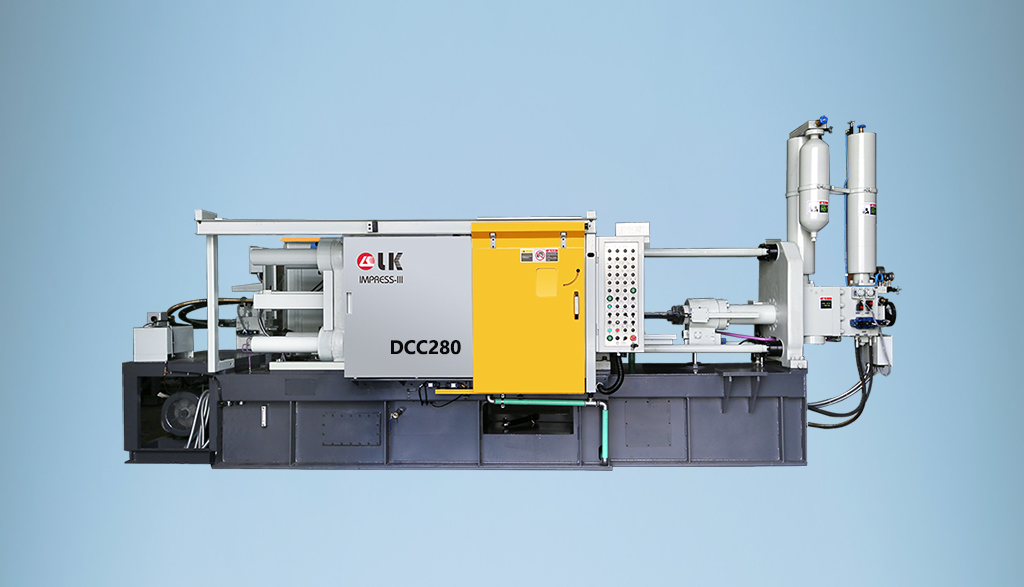
2024-09-19 14:11:06 LK Cold Chamber Die Casting Machine DCC280 Locking Force: 2800KN Die Height: 250-650mm Space Between Tie Bars: 560x560mm Shot Weight: 2.9Kg Casting Area Max:700c㎡
More -
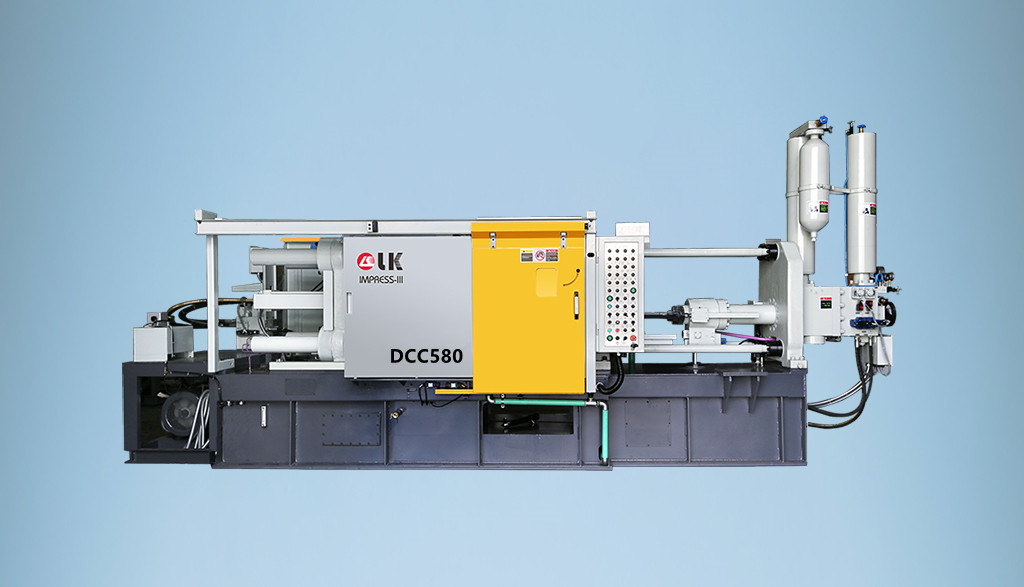
2024-09-19 10:23:07 LK Cold Chamber Die Casting Machine DCC580 Locking Force: 5000KN Die Heigh: 350-850mm Space Between Tie Bars: 760x760mm Shot Weight: 6.9Kg Casting Area Max:1250c㎡
More -
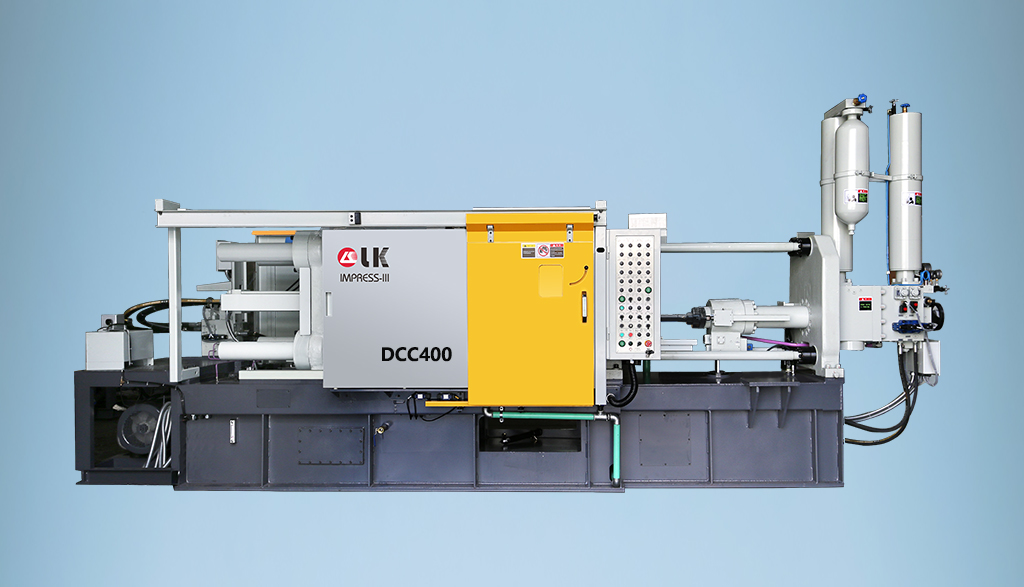
2024-09-19 10:11:20 LK Cold Chamber Die Casting Machine DCC400 Locking Force: 4000KN Die Height: 300-700mm Space Between Tie Bars: 669x669mm Shot Weight: 4.7Kg Casting Area Max:1000c㎡
More

